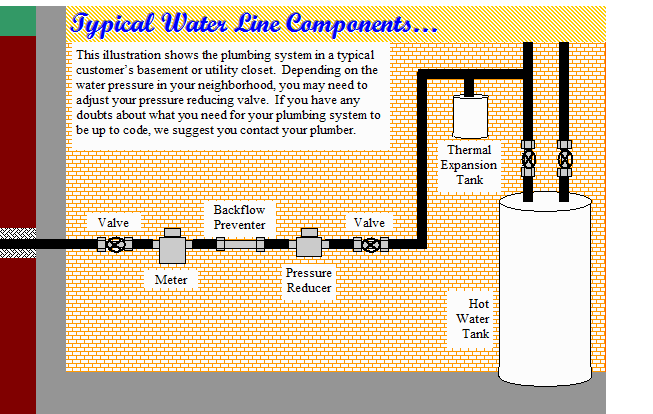 |
 |
 |
 |
 |
 |
 |
 |
|
|
|
|
|
|
|
|
|
|
 |
|
|
|
|
|
BRADFORD CITY WATER AUTHORITY
28 Kennedy Street, Bradford, Pennsylvania 16701
|
|
|
|
|
|
|
|
|
 |
|
|
|
|
|
|
|
Backflow & Thermal Expansion
How They Affect Your Plumbing System
|
|
|
|
|
|
|
|
 |
|
|
|
|
|
|
|
|
|
Safe
drinking water is so commonly available in this nation that we normally
assume any water from a faucet is safe to drink. The Bradford
City Water Authority (BCWA) works hard to insure that the water we
deliver to our customers meets or exceeds all health standards.
However, a potential threat to your drinking water exists. The
threat is backflow, or cross-connection, and it can turn a pure glass
of drinking water into a lethal brew.
|
|
|
|
|
|
|
|
|
|
|
Say
you are watering your garden with a fertilizer or pesticide applicator
attached to your hose. The phone rings, and you leave the
garden. While you are chatting, there is a
|
|
|
|
|
pressure
fluctuation in our system that causes a vacuum. Like a straw, the
vacuum will pull your pesticide-laced water into the public water
supply. The next time you or your neighbors turn on a faucet, the
water could be laced with the pesticides.
Backflow is not just a theoretical possibility. There are many documented cases of this happening.
|
|
|
|
|
|
|
|
|
|
|
Eliminating The Threat...
|
|
|
|
|
|
|
|
|
You
can substantially reduce this threat to drinking water by installing a
backflow preventer, which allows water to pass through it in only one
direction. The Safe Drinking Water Act
|
|
|
|
|
requires
the installation of these devices. PA DEP & BCWA also
requires these devices on water lines serving all customers.
Industrial & commercial customers are required to have their
backflow prevention devices tested annually. Residential
customers are required to have their devices tested once every 5 years.
All testing is to be performed by ASSE certified plumbers.
It only takes one customer without one of these devices to contaminate
the water supply.
|
|
|
|
|
|
|
 |
|
|
|
|
|
|
|
With
a properly installed and tested backflow preventer, water will be
unable to flow back into the public water pipes. The backflow
preventer creates an isolated or closed plumbing system.
For some homeowners, this could produce leaky faucets or set off the
relief valve on hot water heaters.
|
|
|
|
|
|
|
|
|
|
|
The culprit is Thermal Expansion.
Before the backflow protection device was in place, your hot water
heater warmed the water causing it to expand. As the water
warmed, ther
|
|
|
|
|
mal
expansion pushed it back into the public water supply, another example
of backflow. Once the backflow preventer is installed, the water
can no longer expand in this direction and a plumbing system that is
not up to current code could experience the conditions mentioned
above. If your plumbing system is faulty, it could fail once the
system is closed. For example, if thermal expansion exerted
itself and the hot water heater relief valve was stuck, the hot water
heater could develop a leak.
|
|
|
|
|
|
|
|
 |
|
|
|
|
|
|
|
|
|
Most
customers will never experience these problems. For the majority
of those that do, simply lowering the temperature setting of the hot
water tank to 115-125 degrees (which is sufficient for most purposes)
will eliminate the problem. However, we strongly encourage you to
make sure your plumbing systems are up to current building code
standards. You should consult a certified plumber if you have any
doubts about your plumbing's condition. A plumber may recommend
the installation of a thermal expansion tank if you have a hot water
heater or a pressure reducing valve if your water pressure exceeds 75
pounds per square inch (psi). The illustration above shows these
devices installed in a typical basement. As an added note, these
devices will pay for themselves by protecting your plumbing system and
conserving water by helping to prevent failures of your plumbing
fixtures.
The BCWA,
through our backflow protection and other initiatives, strives to
produce water of the highest quality and safety at a reasonable
cost. With the installation and testing of a backflow preventer,
you can rest assured that you are helping to protect your health and
welfare as well as that of your neighbors and the community at large.
|
|
|
|
|
|
 |
|
|
|
|

